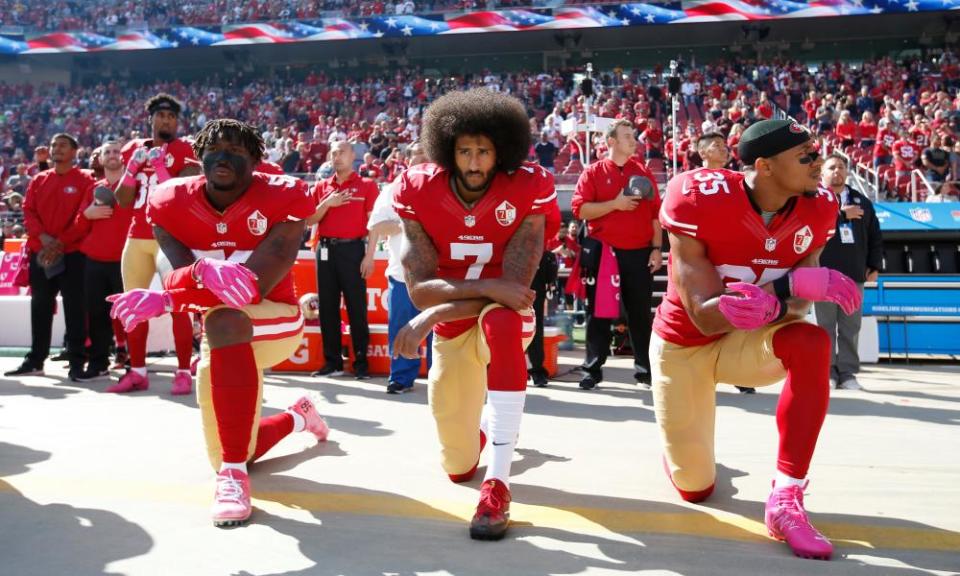Forget Farah: my sporting heroes of 2017 bravely spoke the truth to power | Sean Ingle

For much of the evening the atmosphere was akin to a vast revivalist meeting, with the great and the good of British sport lauded and applauded. It is always the way with the BBC’s Sports Personality of the Year award. But – with the greatest respect to Anthony Joshua, Mo Farah, Lewis Hamilton and the other candidates – my sporting heroes in 2017 are not to be found in a ring, on a track, or in a high-performance car, but in the firing line.
Think of many of the biggest stories of the year. The IOC decision to exclude the Russian Olympic Committee from the Winter Olympics. The protests from NFL players against police brutality and Donald Trump. The mounting concerns over cultural problems in British Olympic and Paralympic sport. And, last week, Chris Froome’s positive drug test.
Each case has a common origin: someone deciding to get their hands dirty, whatever the consequences. And, in many cases, being brave enough to speak the truth to power – and to us – even if it ended up putting their lives or jobs at risk.
So take a bow Grigory Rodchenkov, Colin Kaepernick, and those nameless individuals who decided to quietly make a difference. Sport owes you a huge debt, even if it is unlikely to ever repay it.
That is particularly true with Rodchenkov, the former anti-doping chief who fled Russia at the end of 2015 armed with computer files containing evidence of massive state-sponsored doping. At the time he was accused of being a criminal, ridiculed and abused, and he remains in fear of his life.
At the start of December, however, he was emphatically vindicated – with even the IOC, which has performed more outrageous 360-degree spins than an elite snowboarder in an attempt to keep Russia in the 2018 Winter Olympics, conceding he was right.
It is only down to Rodchenkov that we know what initially sounded like one of John le Carré’s more outrageous plots was true. More than 1,000 Russian athletes were part of a state-funded doping programme – and the Sochi Winter Olympics were corrupted by building a shadow laboratory to switch steroid-tainted samples for clean ones. Kaepernick, meanwhile, has slowly learned the true impact of his initial decision to take a knee in a pre-season NFL game in August 2016 as a protest against police brutality and the oppression of minorities.
A swell of players have since joined the former San Francisco 49er quarterback, and his bravery was recognised by Sports Illustrated’s Muhammad Ali award last month, which honours a figure who embodies the ideals of sportsmanship, leadership and philanthropy. Yet he has not played this season.
Sure Kaepernick, at 30, is not quite the player he once promised to be. But you do not have to be a conspiracy theorist to smell something fishy going on. A legal case against the NFL is ongoing, but Kaepernick has no regrets. As he has put it: “To me, this is bigger than football and it would be selfish on my part to look the other way.”
That is a maxim, thankfully, that increasingly applies to those people inside British sport who have spoken out about issues such as bullying, sexism, racism and dubious classifications in Para-sports. Damian Collins, chairman of the digital, culture, media and sport select committee, also deserves credit for deftly using parliamentary powers and privilege to ask questions of those in power.
Some columnists have suggested that whistleblowing is easy. That, to put it politely, is baloney. It is one thing to get queasy about wrongdoing; quite another to shatter the omerta, especially when it is often seen as a betrayal by your colleagues or country. One whistleblower I know likens the decision to speak as plunging from a diving board without knowing whether they would land on rocks or water.
Without Rodchenkov, for instance, even the limited sanctions against Russia would never have seen the light of day. After all, it was in 2008 the IOC talked about “systematic planned doping” in the country, while in 2010 the World Anti-Doping Agency was approached by another Russian whistleblower, Vitaliy Stepanov. Yet neither of these organisations, which are supposed to uphold the integrity of sport, did anything about the information for years.
There are those who say Rodchenkov talked only to convince the FBI to put him into a witness-protection programme. There is probably some truth to that. But, as we learned this month, while he was a corruptor of international sport he also had a conscience.
In 2013 he was asked by Russia’s deputy minister for sport, Yuri Nagornykh, whether he could “make a sample dirty”. The target Nagornykh had in mind was Vita Semerenko, leader of the Ukraine biathlon squad, chief rival to the Russian team in Sochi. But Rodchenkov concocted an excuse not to do it, telling his boss a reanalysis would show her sample had been spiked.
True, anyone who has watched the documentary Icarus knows that Rodchenkov is a flawed character. But then again, which one of us isn’t? Perhaps it is time more of us recognised a deeper truth. That sporting heroes do not always wear expensive kit or overly tight Lycra. In fact it is not the ones singing the anthem that we should be cheering on the loudest – but those brave enough to make a discordant parp.

 Yahoo Sport
Yahoo Sport 





































